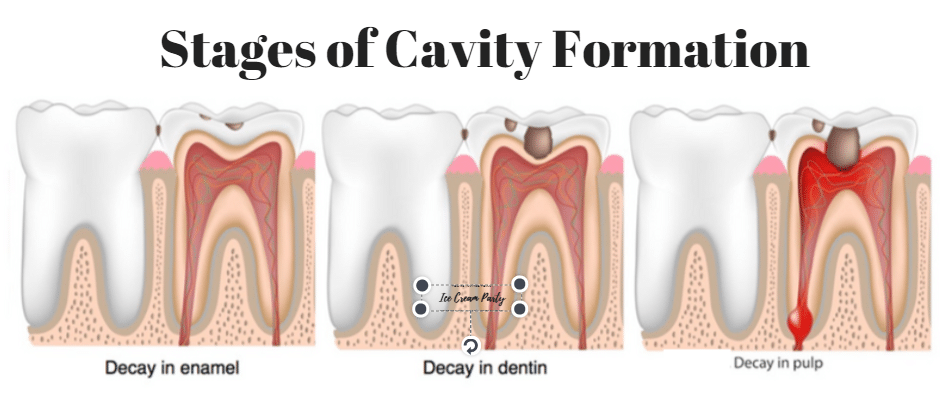What are dental cavities?
A dental cavity is a hole in your tooth that is caused by oral bacteria. Cavities start off when food particles stick to your teeth, known as plaque buildup. If you fail to clean these plaque buildups, bacteria start to attach themselves to your teeth. These bacteria are very harmful. They produce an acidic byproduct that slowly dissolves your tooth, resulting in dental cavities. If left untreated, cavities continue to grow until they reach your tooth nerve. This results in a toothache and infection! Therefore, the sooner you fix your dental cavities, the better the outcome.
What causes tooth decay?

There are 2 things needed for a cavity to form on your teeth: (1) bacteria and (2) sugars. It turns out, cavity bugs love sugars… and what better place for bacteria to digest these sugars than when sitting comfortably on your teeth! This is exactly how dental cavities develop.
Am I at risk for developing dental cavities?
Cavities can arise at any age. So long as you have teeth in your mouth, you’re at risk of developing dental cavities. Children, adults, and seniors can all develop cavities on their teeth:
- Children can develop cavities on baby teeth as soon as their first teeth come out. Since babies start teething at around 6 months old, they can develop their first cavity before even turning one!
- Adult teeth start to come out when you’re around 6 to 7 years old. Again, you can develop cavities on your adult teeth as soon as they start to come out.
- Teenagers and college students are very susceptible to developing new cavities due to their lifestyle. However, cavities don’t just stop here. Adults and seniors are also prone to developing new cavities on their teeth.
- Older adults don’t develop new cavities as often. Instead, they develop what’s known as recurrent cavities. These are cavities that are formed under older fillings and crowns.
Which teeth surface are at the highest risk of cavity formation?
Cavities can form on any tooth surface you can imagine. Having said that, cavity bugs prefer to accumulate in teeth groves. This means that the most common location for cavities to form is on the chewing surfaces of your back teeth. The next most common location is in-between your teeth. This is why it’s so important to brush and floss your teeth regularly to remove bacteria from your teeth surfaces.
How do I prevent cavities?

The best way to prevent cavities is to live a healthy lifestyle. Here are our a few tips on how you can reduce your chances of developing dental cavities:
- Eat a healthy diet: Stich with a healthy diet and avoid sugars. Cavity bugs love processed sugars that are found in sweets, candies, and sodas. Try to minimize your sugary intake. Whenever you eat sweets, rinse or brush your teeth as soon as you can afterward.
- Brush and floss your teeth: Thoroughly clean your teeth at least once a day. This prevents food and plaque from accumulating on your teeth which helps fight off dental cavities.
- Regular checkups and cleanings: Visiting your dentist regularly is another great way of making sure your teeth stay cavity-free. During your visit, your dentist will look for cavities, clean your teeth, and review you oral hygiene habits. Sometimes they even offer you preventive treatments to try and minimize your risks of developing dental cavities.
What happens if I don’t fix my cavity?

Unfortunately, cavities never fix themselves. Cavities start off from your outer tooth surfaces and work their way towards your tooth nerves. If you neglect to fix a cavity, it eventually manages to reach your tooth nerve. Once this happens, you develop severe pain and infection. To avoid this, fix your cavities as soon as possible. Small-to-medium sized cavities can easily be fixed with a dental filling. However, once a cavity reaches your tooth nerve, getting a filling is no longer an option. At this point, you will require a crown and root canal. You may even lose your tooth!
If you think you have a cavity, don’t waste any more time. Contact your dentist immediately to have your tooth checked out as soon as possible. Click on the link below to use our dentist Search Engine to find a great dentist near you. Read their reviews, check out their office hours, view their treatment photos, even book your appointment online today:
0 Comments